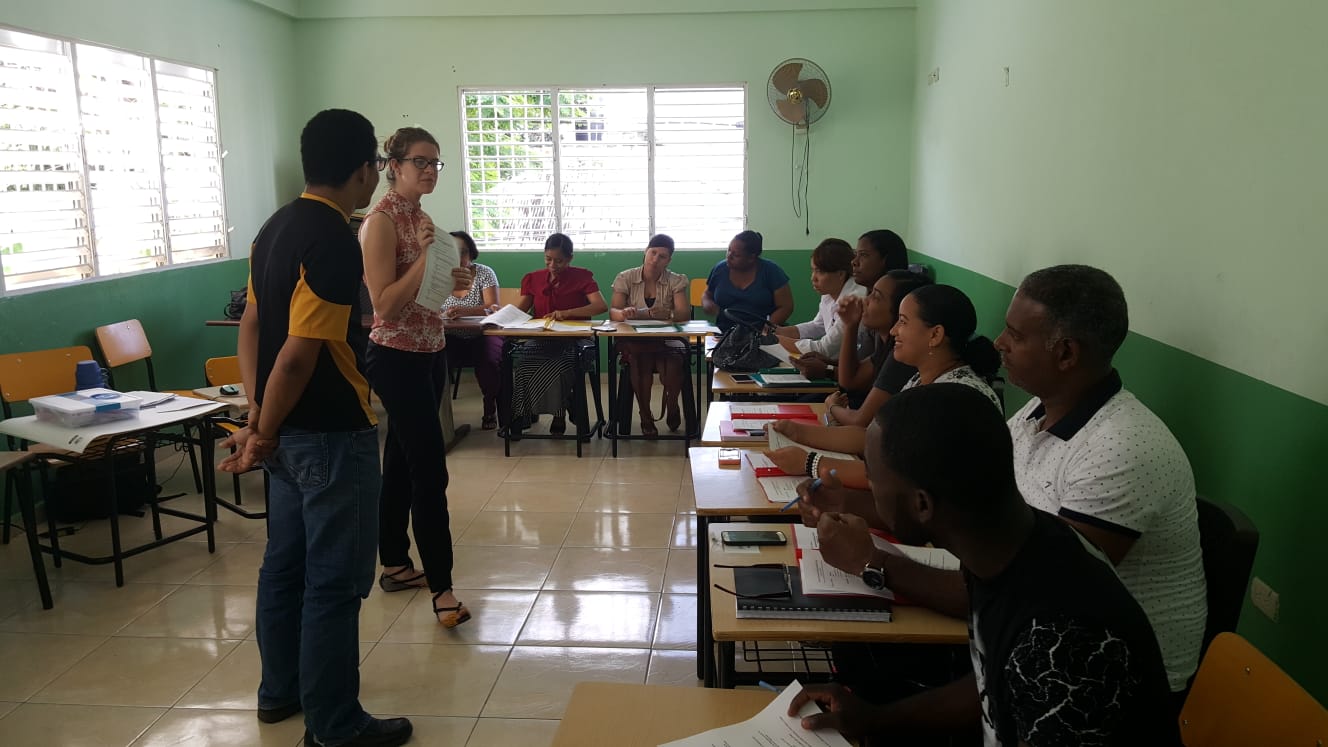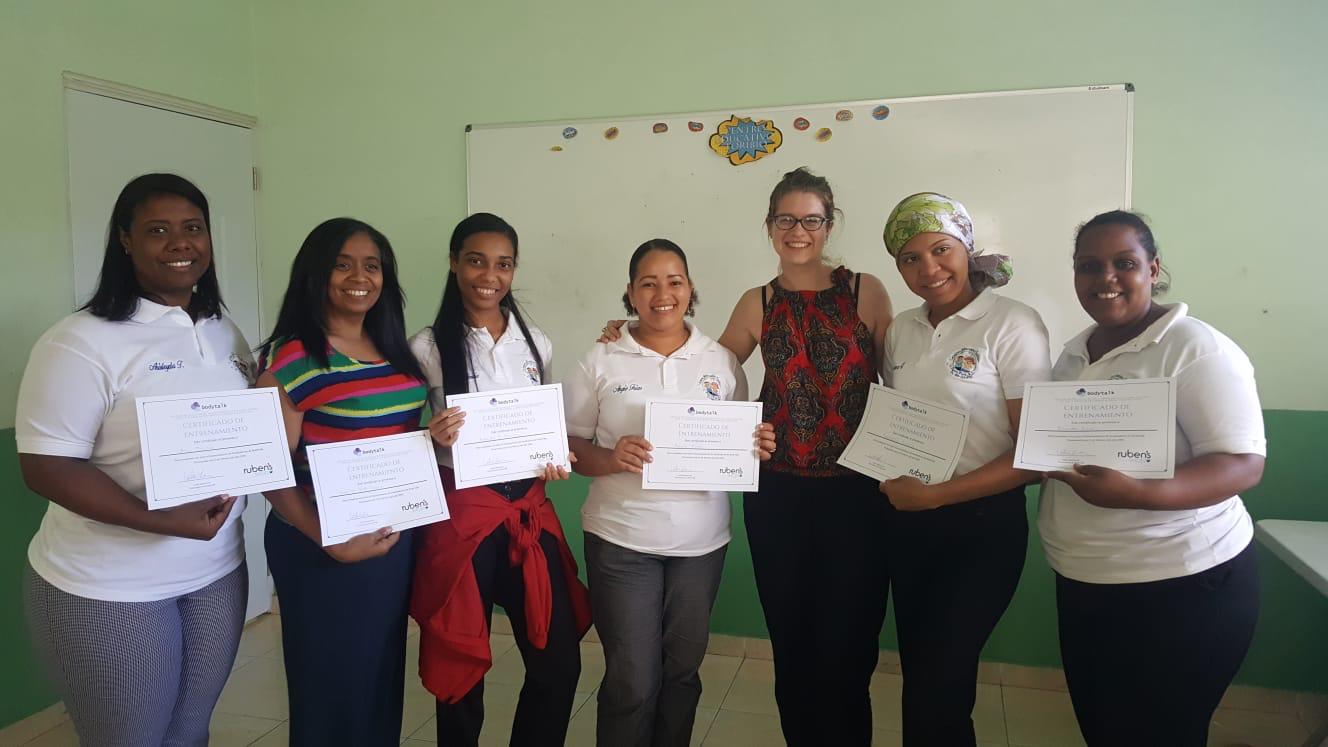Preventing Teen Pregnancy in the Dominican Republic
/In Feburary 2019, I went to the Dominican Republic with Canadian charity Rubens Shoes to launch my sexual and reproductive health program “BodyTalk”. I had a blast working with the amazing teachers of Centro Educativo Toribio and watching the kids giggle while they learn about their bodies. Read my trip report below, with lots of pictures!
Day 1 of the sexual and reproductive health teacher training in the Dominican Republic! I led a training for ten facilitators to learn to teach HIV prevention, gender equity, consent, and how to prevent sexual assault.
The Dominican Republic is a strong Catholic country. Participants pointed out that, while their personal faith encouraged them to learn and teach sexual health and education, their church is also a space where rampant sexual abuse occurs.
One participant explained that she liked the part of the training where we emphasized the fact that women and girls have power. This is so important for preventing abuse, which is rampant in the DR. Learning to communicate, understanding consent, and knowing how to find help is crucial for young people, especially girls, to feel safe and to avoid risky situations.
Another participant: “I didn’t know there was a medicine you could take to prevent HIV before actually getting it!” (It’s called PrEP—learn more) While it’s unclear whether PrEP is available in the DR, it’s still key to know that if you think you’ve been exposed, you should talk to a health professional about your options.
Through games and activities, the participants were engaged and ready to try some sample lessons on their own.
Day 2. A total of 10 teachers graduated from the program and are excited to start implementing at their school.
A brave facilitator practiced giving a condom demonstration today. A shocking number of participants, including my 22-year-old translator, had never seen a condom demonstration before. “Do all condoms really have lubricant?!” “Why is lubricant necessary?” “I never knew you were supposed to leave space at the tip of the condom!” Negotiating condom use in a country where a mere 2% of the population uses condoms is tough; learning that it’s your right to demand their use can be life changing and empowering for women.
We then discussed birth control options, some of which were familiar and some were not. Many birth control options are not available in the DR or are only available at expensive, private clinics. Demanding that restrictive governments increase access to contraception is key for women’s health and wellbeing.
One participant shared, “After the first day of training, I decided that I need to share this information with people at my church. They need to know, too. Thank you for teaching us!” Another said, “When I went home after the training, my 18-year-old niece started looking at the material and she was so interested—she couldn’t stop looking! It was good to share this information!”
We also had a meeting for the parents, to get them on board with their kids learning this invaluable information and to make sure we have permission to teach. Some parents expressed concern about “pro-sex” programs and wanted to emphasize that they teach their kids to abstain like good children should. It’s tricky explaining that with comprehensive information, kids have the ability to make better, healthier choices (which often includes delaying first sex), but by the end, the overwhelming majority wanted the program for their kids and were even asking for their older youth to participate, too.
Time to convince those parents…
Day 3. We held a workshop on reproductive health topics for a group of kids ages 12-15. What began with a room full of silence and awkward teenagers turned into an empowering space for youth to discuss consent, preventing sexual abuse, goals, and gender equality.
In the workshop, the kids passed around a menstrual pad, hot potato style, with no one wanting to touch it, while normalizing periods and discussing how men and boys can support their sisters and female family members during their periods. We practiced setting long-term goals and talked about how having a child too early can affect goals like finishing school. The kids practiced asking “Can I give you a high-5? Can I give you a hug?” and discussed how asking for consent can prevent sexual assault.
The most powerful activity was hearing the kids practice saying “no”. Unfortunately, we live in a world where 35% of women will experience sexual assault in their lifetime. The kids stood in a circle and practiced touching each other on the shoulder while saying in a strong, confident voice: “Do not touch my shoulder.” Amongst the giggles, there was the start of building confidence and understanding their rights. Having that confidence and that ownership over their bodies is so important to having healthy sexual relationships.
Testing their knowledge on puberty
Practicing consent
Practicing communication skills
Writing long-term goals
Day 4. I can’t believe it’s already the last day! Despite the chaos of starting a new class, our new facilitators pulled off their first lesson on anatomy today. Twenty-two students in grades 4 and 5 were present. The boys, being 10-year-old boys, giggled and wiggled a lot and asked why their penis is so wrinkly and why the vulva is weird. The girls were so excited to learn and asked questions nonstop, putting their new teachers to the test. The program will run for 9 weeks and will continue throughout the year.
Many thanks to Rubens Shoes for their support of this program and to Centro Educativo Toribio for their awesome teachers and kiddos! #SexEdMatters y’all.
Guess that body part for the boys
Guess that body part. “How many breasts are there again…?”


















